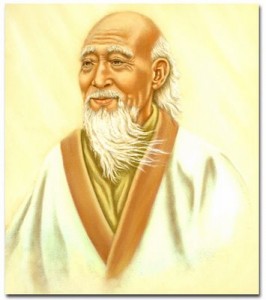
I suppose most of you come on Fridays to listen to the reading of Wu Wei. If you have listened, you will remember that something’s said there about being “spontaneous”, and that the true way of living the true life is to live spontaneously.
What Lao Tse calls spontaneous is this: instead of being moved by a personal will—mental, vital or physical—one ought to stop all outer effort and let oneself be guided and moved by what the Chinese call Tao, which they identify with the Godhead—or God or the Supreme Principle or the Origin of all things or the creative Truth, indeed all possible human notions of the Divine and the goal to be attained.
To be spontaneous means not to think out, organise, decide and make an effort to realise with the personal will.
I am going to give you two examples to make you understand what true spontaneity is. One—you all know about it undoubtedly—is of the time Sri Aurobindo began writing the Arya¹, in 1914. It was neither a mental knowledge nor even a mental creation which he transcribed: he silenced his mind and sat at the typewriter, and from above, from the higher planes, all that had to be written came down, all ready, and he had only to move his fingers on the typewriter and it was transcribed. It was in this state of mental silence which allows the knowledge—and even the expression—from above to pass through that he wrote the whole Arya, with its sixty-four printed pages a month. This is why, besides, he could do it, for if it had been a mental work of construction it would have been quite impossible.
That is true mental spontaneity.
And if one carries this a little further, one should never think and plan beforehand what one ought to say or write. One should simply be able to silence one’s mind, to turn it like a receptacle towards the higher Consciousness and express as it receives it, in mental silence, what comes from above. That would be true
spontaneity.
Naturally, this is not very easy, it asks for preparation.
And if one comes down to the sphere of action, it is still more difficult; for normally, if one wants to act with some kind of logic, one usually has to think out beforehand what one wants to do and plan it before doing it, otherwise one may be tossed about by all sorts of desires and impulses which would be very far from the inspiration spoken about in Wu Wei; it would simply be movements of the lower nature driving you to act. Therefore, unless one has reached the state of wisdom and detachment of the Chinese sage mentioned in this story, it is better not to be spontaneous in one’s daily actions, for one would risk being the plaything of all the most disorderly impulses and influences.
The Mother
1. It was in the review Arya, within a period of six years (1914-1920), that Sri Aurobindo published most of his major works: The Life Divine, The Synthesis of Yoga, The Human Cycle (originally The Psychology of Social Development), The Ideal of Human Unity, Essays on the Gita, The Secret of the Veda, The Future Poetry, The Foundations of Indian Culture (originally a number of series under other titles).





